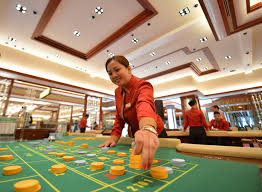The Legal Side of the Philippines Casino (필리핀 카지노): What You Should Know
The Philippines Casino (필리핀 카지노) industry is one of Asia’s most rapidly developing gaming markets — but what sets it apart from other countries isn’t just its growth, it’s the way it’s regulated. From licensing and taxation to responsible gaming, the Philippine legal framework is considered one of the most transparent and effective in the region.
Whether you’re a local player, a foreign tourist, or a business investor, understanding the laws behind the country’s casino industry helps ensure a safe and responsible experience.
A Brief History of Legalized Gaming in the Philippines
Casino gaming has been part of the Philippine entertainment scene for decades, but the industry was officially organized with the creation of the Philippine Amusement and Gaming Corporation (PAGCOR) in 1976.
PAGCOR was established by a Presidential Decree to regulate, operate, and license games of chance — ensuring that gaming profits benefit national development. Since then, the 필리핀 카지노 (Philippines Casino) industry has evolved from small gaming halls into luxurious integrated resorts that meet international standards.
The Role of PAGCOR: Regulator and Operator
PAGCOR plays a unique dual role in the Philippines Casino (필리핀 카지노) ecosystem. It serves as both a regulator (licensing and supervising private casinos) and an operator (running state-owned casinos).
This model allows the government to directly oversee casino operations while ensuring fairness, accountability, and public benefit. PAGCOR revenues support education, health care, disaster relief, and infrastructure projects — making gaming a contributor to national progress.
Who Can Play and Where
Under Philippine law, only individuals aged 21 and above are allowed to enter or play in casinos. Players must also present valid government-issued identification or a passport.
Casinos are open to both locals and foreigners, though there are strict rules on self-exclusion and financial limits to encourage responsible gaming.
The major legal 필리핀 카지노 hubs are located in Entertainment City (Manila), Clark Freeport Zone, and Cebu, with new developments expanding to other regions under government supervision.
Online Gaming: Legal but Regulated
The Philippines is one of the few Asian countries where online gaming operates under a clear legal framework. PAGCOR licenses both land-based casinos and Philippine Offshore Gaming Operators (POGOs) — online platforms serving international markets.
However, online operators must adhere to stringent requirements, including:
- Regular auditing and financial transparency
- Age verification systems
- Data protection and anti-money laundering compliance
This ensures that even the virtual side of the Philippines Casino (필리핀 카지노) industry maintains the same level of integrity as physical casinos.
Responsible Gaming Laws
The Philippine government places great emphasis on responsible gaming. PAGCOR requires all casinos to implement programs that protect players from potential harm, including:
- Self-exclusion options for players who want to limit their access
- Mandatory employee training on responsible gaming awareness
- Visible on-site reminders about moderation and support resources
These initiatives align with global standards, ensuring that the 필리핀 카지노 industry grows sustainably and ethically.
Taxation and Economic Contribution
Casinos in the Philippines are subject to government taxation and licensing fees. A portion of these revenues is reinvested into public welfare programs.
In 2024 alone, PAGCOR reported record contributions to social projects — highlighting how the Philippines Casino (필리핀 카지노) industry directly benefits local communities. This “profit with purpose” model distinguishes the Philippines from many other gaming destinations.
Penalties and Legal Enforcement
Violations of gaming laws — such as unlicensed operations, underage gambling, or fraudulent practices — are met with strict penalties. PAGCOR works closely with law enforcement agencies to ensure that both operators and players follow the rules.
This robust enforcement gives the industry a reputation for safety and fairness, attracting tourists and investors who value transparency.
A Global Model of Regulation
The 필리핀 카지노 system is now seen as a model for developing gaming markets around the world. Its balance of openness and responsibility ensures that both players and businesses benefit from a structured, ethical environment.
For visitors, that means you can enjoy your favorite games in a country where regulation isn’t a barrier — it’s a promise of trust.







